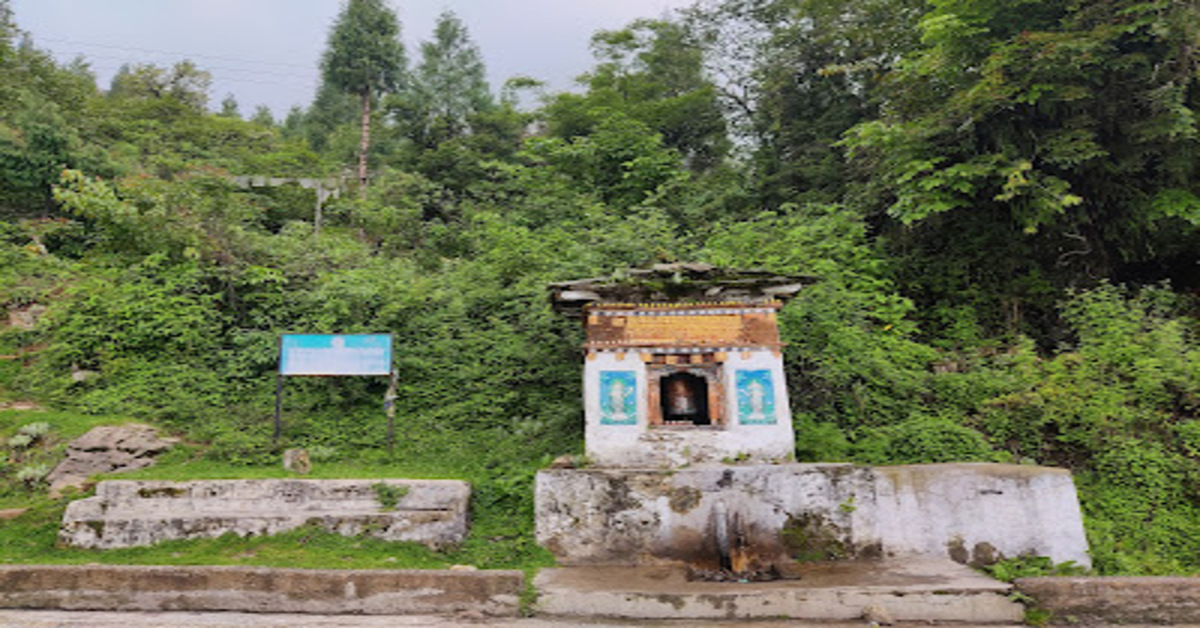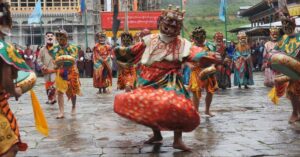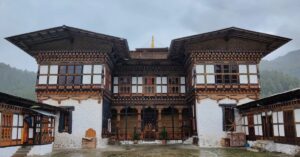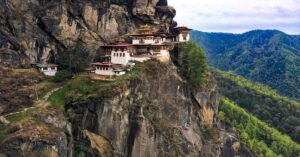Tsheringma Drupchhu is a holy spring water of the goddess Tsheringma in Zalamchu, Tshangkha of Tangsibji under Trongsa Dzongkhag at an altitude of 2300 meters. The common belief is that if Tsheringma Drupchu is the first drop of water a child drinks, the child will have a melodious voice.
The spring sprouts out from a small meadow on a hill believed to be the citadel of the local deity Dragpa Gyaltshen, also known as Seju Gentse or Agay Yosey. The residents of Tangsibji village revere the deity as their Kaylha (natal deity), Yuelha (village deity), and Dralha (protector deity). In earlier times, He is said to have impregnated local girls, and His offspring were known for their superhuman strength. Due to the reverence for the deity, the areas surrounding His citadel have minimal human interference.
How to Reach Tsheringma Drupchhu
Tsheringma Drubchu, the holy water of Tseringma, is in Zalamchu right on the Wangdue-Trongsa highway before you hit the village of Tshangkha in Trongsa. Zalamchu is about 25km away from Trongsa towards Wangduephodrang.
Also Read: Drupchhu or Holy Spring Waters in Bhutan: Beliefs and Benefits
Historical Significance of Tsheringma Drupchhu
As per oral history, the second King, Jigme Wangchuck, commanded a Tsipoem, a lead singer from Tangsibji, to sing at the Kuenga Rabten Palace.
On the night before her journey, she dreamt of a woman dressed in white. The woman instructed her to visit the spring known as “Ba-Khey-Thong-Sa”, a place where the bulls drink water, and to take a head shower, and drink the water before starting her journey to the palace.
At dawn, she followed the instructions given in her dream and journeyed to the palace with her troupe. During the performance of the Mangde Tangsibji Zhyem, a classical song originated from Tangsibji, her melodious voice even made the King weep. As a reward for her voice, the King gifted her wetland and other gifts.
Later, when the Padseling Trulku visited the village, the Tsipoem narrated her dream and the outcome to the Trulku. Based on significance, the Trulku confirmed the spring water as the holy water of the goddess Tashi Tsheringma. Goddess Tsheringma is believed to be a mountain goddess who is the head of the five Tshering sister goddesses. These goddesses were believed to be: war deities if high officials sought blessings of power; goddesses of wealth if people sought blessings of wealth; and goddesses of speech if people sought eloquence and a pleasing voice.
Even now, the village dancers visit the Tsheringma Drupchu to take a head shower and invoke the local deity, before they venture out to perform on important occasions. The dancers perform the Tangsibji Zhyem as an offering to appease and seek protection and guidance from the local deity.
Ethnopharmacological Uses and Benefits of Tsheringma Drupchhu
Tsheringma Drupchhu has spiritual and medicinal benefits. For instance, the holy water of Tsheringma is believed to have been established by the deity of longevity, the goddess Tshe-ring-ma. Thus, drinking or bathing in it is believed to enhance longevity. The Bhutanese also believe that this spring water can produce a melodious voice, a quality usually desired by singers. People from Tshangkha village who live near the Tsheringma holy water usually have a melodious voice since it is their primary source of drinking water.
For medicinal benefits, this holy water is sought to treat throat-related disorders.
Best Time to Visit Tsheringma Drubchhu
Since Tsheringma Drupchhu is channeled through astupa on the road ahead, it is easily accessible for travelers. You can visit at any time of the year. People usually visit this holy water while traveling along the Wangdue-Trongsa Highway. You can visit the holy spring waters in Bhutan with the Bhutan Pilgrimage Package.
Places to Explore in Trongsa
Trongsa Dzong: It is Bhutan’s largest fortress, majestically overlooking the Mangde River valley. Built in the 17th century, it served as a strategic military and administrative center. Renowned for its intricate architecture and historical significance, the dzong played a crucial role in Bhutan’s unification and remains a symbol of royal heritage.
Ta Dzong (The Tower of Trongsa Museum): Built in 1652 by Chogyal Minjur Tempa, the first Governor of Trongsa, it is a historic watchtower overlooking Trongsa Dzong. It features four observation points shaped like a Tiger, a Lion, a Garuda, and a Dragon. Converted into the Royal Heritage Museum in 2008, it showcases Bhutan’s monarchy, royal artifacts, and Buddhist relics across eleven galleries.
Nabji Lhakhang: It is a one-story traditional temple built by Khandro Tashi Khyidren at the site where Guru Rinpoche mediated peace between two warring kings by erecting a stone pillar of oath. It holds sacred relics and hosts an annual festival, symbolizing harmony and spiritual heritage.
Chendebji Chorten: It is a stupa built in the 18th century modeled after Nepal’s Swayambhunath. The whitewashed Chorten symbolizes peace and protection.
Kuenga Rabten Palace: Built in 1929 near Trongsa, it served as the winter residence of Bhutan’s second King, Jigme Wangchuck. This two-story Bhutanese-style palace features traditional architecture, a temple, and royal apartments. It now functions as a monastery and cultural site, preserving royal history and hosting monks.
Enjoyed reading this blog?




